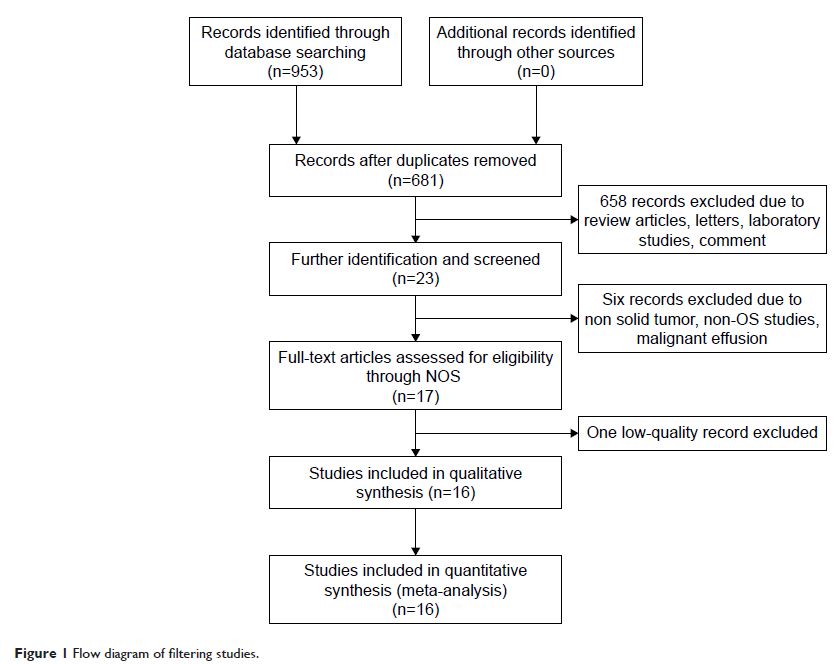109568
论文已发表
注册即可获取德孚的最新动态
IF 收录期刊
- 3.4 Breast Cancer (Dove Med Press)
- 3.2 Clin Epidemiol
- 2.6 Cancer Manag Res
- 2.9 Infect Drug Resist
- 3.7 Clin Interv Aging
- 5.1 Drug Des Dev Ther
- 3.1 Int J Chronic Obstr
- 6.6 Int J Nanomed
- 2.6 Int J Women's Health
- 2.9 Neuropsych Dis Treat
- 2.8 OncoTargets Ther
- 2.0 Patient Prefer Adher
- 2.2 Ther Clin Risk Manag
- 2.5 J Pain Res
- 3.0 Diabet Metab Synd Ob
- 3.2 Psychol Res Behav Ma
- 3.4 Nat Sci Sleep
- 1.8 Pharmgenomics Pers Med
- 2.0 Risk Manag Healthc Policy
- 4.1 J Inflamm Res
- 2.0 Int J Gen Med
- 3.4 J Hepatocell Carcinoma
- 3.0 J Asthma Allergy
- 2.2 Clin Cosmet Investig Dermatol
- 2.4 J Multidiscip Healthc

微小 RNA-100 在实体瘤中的预后意义: 一项更新的综合分析
Authors Wang J, Yu M, Guan S, Zhang G, Wang J, Cheng Y
Received 20 September 2016
Accepted for publication 5 November 2016
Published 23 January 2017 Volume 2017:10 Pages 493—502
DOI https://doi.org/10.2147/OTT.S122774
Checked for plagiarism Yes
Review by Single-blind
Peer reviewers approved by Dr Ashok Kumar Pandurangan
Peer reviewer comments 2
Editor who approved publication: Dr Chiung-Kuei Huang
Objective: The aim of this study was to identify prognostic significance of
microRNA-100 (miR-100) in solid tumor.
Methods: Literature search was conducted in databases such as
PubMed, Embase, and Web of Science, using the following words “(microRNA-100 OR
miR-100 OR mir100) AND (tumor OR neoplasm OR cancer OR carcinoma OR
malignancy).” The search was updated up until July 10, 2016. Newcastle–Ottawa
scale was used to evaluate the quality of studies. Pooled hazard ratio (HR)
with 95% confidence interval (CI) for patients’ survival was calculated by
using a fixed-effects or a random-effects model on the basis of heterogeneity.
Subgroup analysis, sensitive analysis, and meta-regression were used to
investigate the sources of heterogeneity. Publication bias was evaluated by
using Begg’s and Egger’s tests.
Results: A total of 16 articles with
1,501 patients were included in the present meta-analysis. It was demonstrated
that a lower expression of miR-100 plays a negative role in the overall
survival (OS) of patients with solid tumor (HR =1.92; 95% CI =1.25–2.94). In
addition, the association between miR-100 and prognosis was also revealed in
the following subgroups: non-small-cell lung cancer (NSCLC; HR =2.46; 95% CI
=1.98–3.06), epithelial ovarian cancer (EOC; HR =2.29, 95% CI =1.72–3.04), and
bladder cancer (BC; HR =4.14, 95% CI =1.85–9.27).
Conclusion: This meta-analysis indicates that
lower expression of miR-100 is related to poorer OS in patients with solid
tumor, especially in those with NSCLC, EOC, and BC. MiR-100 is a promising
prognosis predictor and may be a potential target for therapy in the future.
Keywords: microRNA-100,
prognosis, meta-analysis
